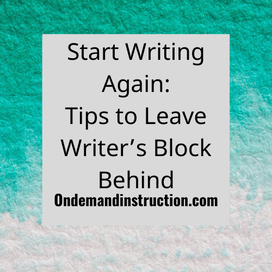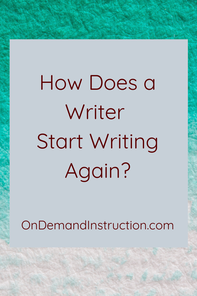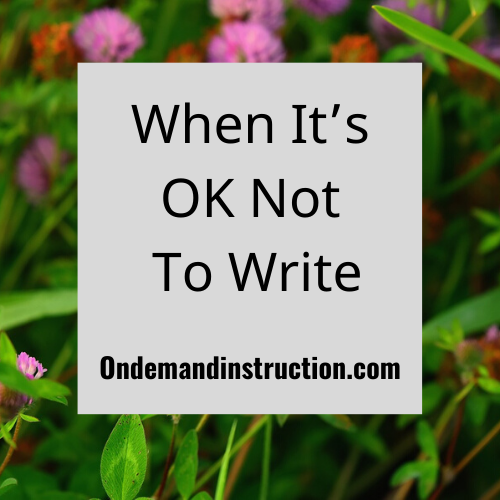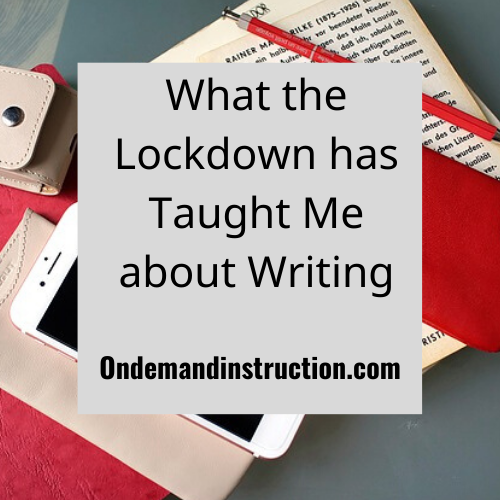
Like the rest of the world, I spent the last few months with limited contact with my community. My kids are attending school online, I am working remotely, and our summer travels are limited to trips to the grocery store and bike rides at the park.
During this time, I have not written much. In fact, I found it challenging just to read. Usually I read twice a day, but I didn't for the first two months of my isolation. I returned to reading in slow steps, but eventually, the newspaper and I got reacquainted and books and I found each other again. After my anxiety about the new routine passed, the writing started to return. It didn’t arrive as an explosion of creativity, though that would have been wonderful. It came back in trickles. The return of writing reminded me to take it easy when reengaging, and I had to take the advice I had given dozens of writing students in the past: start small to start writing. Reengaging with writing after time away from the page can bring the dreaded writer’s block: the feeling of not knowing where to start. Every writer has experienced writer’s block at some point, and it’s no fun. But writers can take some simple steps to overcome writer’s block and start writing again. Success! Now check your email to confirm your subscription.
4 Ways to Overcome Writer's Block and Start Writing Again
1. Six-Word Memoir The six-word memoir is just what it sounds like: It's a personal story told with just six words. The legend goes that a journalist challenged Hemingway to tell a poignant story with just six words, and in typical Hemingway style, he accepted and wrote: Baby shoes for sale. Never worn. Those six words give you a sense of the story. You get tone, character, situation. A whole story can be told with just six words, and many have been; in fact, there are now collections of six-word memoirs. If you're ready to start writing, try a six-word memoir to start. You can think of the overarching theme of your life and write a six-word memoir about that, or you can focus on a smaller story and capture a single event in one line. Here are a few examples: Things didn’t turn out as expected. Single girl, ginger cat, vintage guitar. She said yes then ran away. I should have taken a left.
2. Collect Snapshots
When you start writing again, you don’t have to tackle a novel. Starting out small tends to be best for getting back into a creative routine. Take time to collect snapshots rather than whole stories. Composing a small scene, a conversation, or a description of a setting can go a long way toward reigniting your creative energy. Here are a few ways you can collect snapshots:
3. 50-Word Stories
Limiting the amount of space for a story can be helpful in getting a story down on paper, whereas an open-ended story can take ages to write. A 50-word story must be exactly 50 words (not 49, not 51) and can be useful for helping writers focus on the value of each word. 50 words may sound limiting, but the limit can help a writer get started and allow for a short creative burst, which can help to establish a writing routine. Here are a couple of prompts to use when writing a 50-word story:
4. "What If" Questions
Many great novels, stories, and films began with a writer asking a "what if" question. I recently read a vampire trilogy. The author said she wondered what types of jobs vampires would need to have considering their long lives. That question served as the inspiration for her trilogy (as it turns out vampires become research scientists and medical doctors). Create a list of five "what if" questions that are interesting to you. Here are some "what if" questions to get you started:
You can see how asking a "what if" question can spark some interesting ideas. This kind of thinking can open up new avenues for your stories, poetry, or essays. Asking "what if?" encourages risk-taking in writing and engages the creative mind in a different way. Every writer spends time away from the page. People get sick, work takes too much time, other priorities creep in and take precedence over our schedules—and writing falls to the wayside. After that downtime, it can be challenging to get back into the swing of things. Writer's block looms large. Using these simple techniques, writers can re-establish their writing practices and get back to writing. Related Blog Posts
|
About the SiteWelcome, Writers! Archives
September 2023
|






 RSS Feed
RSS Feed